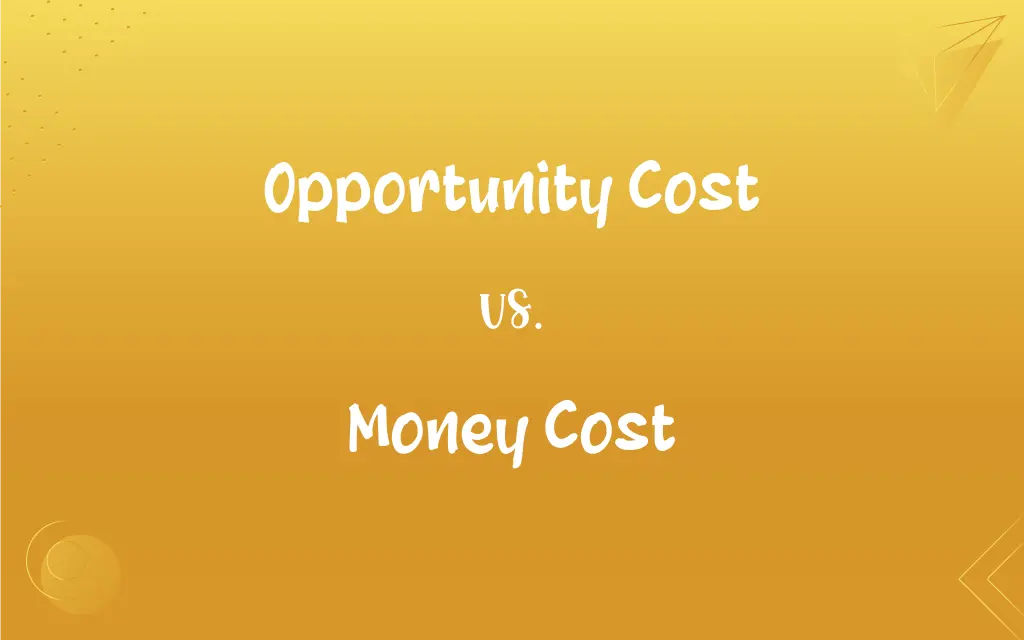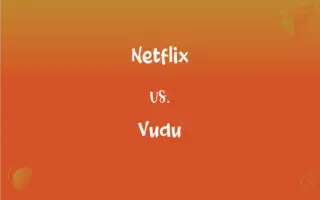Opportunity Cost vs. Money Cost: What's the Difference?
Edited by Aimie Carlson || By Harlon Moss || Published on January 25, 2024
Opportunity cost is the benefit lost by choosing one alternative over another, while money cost is the actual financial expenditure involved.

Key Differences
Opportunity cost represents the potential benefits an individual, investor, or business misses out on when choosing one alternative over another. Conversely, money cost is the tangible financial outlay involved in a transaction or decision, usually measured in terms of currency.
Opportunity cost is a concept used in decision-making that involves evaluating the potential gains from missed opportunities, while money cost specifically refers to the direct monetary expenses incurred in the purchase or investment in goods or services.
Opportunity cost is more abstract, as it considers the value of the next best alternative which is not chosen. In contrast, money cost is concrete and quantifiable, easily calculated by summing up the actual expenses.
In business, opportunity cost is crucial for strategic decision-making, assessing what could have been gained by taking a different decision. Money cost, however, is often used for budgeting and accounting, reflecting the actual cash outflow.
Understanding opportunity cost leads to better resource allocation by highlighting potential missed gains, while understanding money cost helps in financial planning by presenting clear expenses.
ADVERTISEMENT
Comparison Chart
Definition
Value of the next best alternative forgone
Actual financial expenditure involved
Nature
Abstract and theoretical
Concrete and measurable
Usage
In decision-making and evaluating alternatives
In accounting and financial transactions
Measurement
Not always quantifiable
Quantifiable in monetary terms
Relevance
Important for strategic choices and resource allocation
Crucial for budgeting and financial management
ADVERTISEMENT
Opportunity Cost and Money Cost Definitions
Opportunity Cost
The benefit one misses out on when choosing a different path.
Opting for a vacation instead of a summer course was an opportunity cost regarding education.
Money Cost
The sum of all expenses in monetary terms.
The money cost for the event included venue rental and catering fees.
Opportunity Cost
The cost of missing out on the next best alternative.
By working overtime, the opportunity cost was missing her daughter's recital.
Money Cost
The actual amount of money spent on a product or service.
The money cost of the new laptop was $1,200.
Opportunity Cost
The implicit cost associated with forgone alternatives.
Spending time on social media had the opportunity cost of not studying for the exam.
Money Cost
The financial outlay required for a particular action or decision.
Hiring the consultant had a money cost of $3,000.
Opportunity Cost
A measure of an alternative given up to pursue a certain action.
The entrepreneur faced the opportunity cost of a steady job by starting his own business.
Money Cost
The price paid in currency for acquiring or producing something.
The money cost of manufacturing the goods was $5 per unit.
Opportunity Cost
The loss of potential gain from other alternatives when one is chosen.
Choosing to invest in stocks meant an opportunity cost of not earning interest from a savings account.
Money Cost
The total financial expenditure involved in a transaction.
Renovating the house had a money cost of $15,000.
FAQs
Can opportunity cost be measured in monetary terms?
Not always, as it often involves intangible benefits.
How is money cost different from opportunity cost?
Money cost is the actual financial spending, while opportunity cost is the benefit lost from not choosing an alternative.
Why is money cost important in accounting?
It provides a clear record of financial expenditures.
How do businesses use opportunity cost?
For strategic decision-making and assessing potential gains from different choices.
What factors influence money cost?
Prices, quantity, and costs of production or acquisition.
What is opportunity cost in simple terms?
The potential benefit lost by choosing one option over another.
How do you calculate money cost?
By summing up all monetary expenses related to a decision or action.
Is money cost always a clear amount?
Yes, it's the actual amount spent, which is measurable.
Can opportunity cost affect personal decisions?
Yes, it impacts choices by considering what is forgone.
Is opportunity cost subjective?
To some extent, as it's based on individual valuation of alternatives.
Does opportunity cost always involve financial factors?
No, it can involve any type of benefit, not just financial.
Does time affect opportunity cost?
Yes, as different opportunities can emerge over time.
Are opportunity costs considered in market analysis?
Yes, they're key in evaluating potential market opportunities.
Does money cost include indirect expenses?
It includes all direct and indirect monetary expenses.
Can inflation affect money cost?
Yes, as it changes the value of money over time.
Does opportunity cost play a role in investment decisions?
Yes, it's crucial in choosing between different investment options.
How do lifestyle choices relate to opportunity cost?
They involve weighing potential benefits of different life paths.
Can opportunity cost be zero?
Theoretically, if there are no other valuable alternatives.
Is money cost relevant in budgeting?
Absolutely, as it helps in planning and allocating resources.
Are sunk costs and money costs the same?
No, sunk costs are already incurred and irreversible, while money costs are current or future expenses.
About Author
Written by
Harlon MossHarlon is a seasoned quality moderator and accomplished content writer for Difference Wiki. An alumnus of the prestigious University of California, he earned his degree in Computer Science. Leveraging his academic background, Harlon brings a meticulous and informed perspective to his work, ensuring content accuracy and excellence.
Edited by
Aimie CarlsonAimie Carlson, holding a master's degree in English literature, is a fervent English language enthusiast. She lends her writing talents to Difference Wiki, a prominent website that specializes in comparisons, offering readers insightful analyses that both captivate and inform.







































































